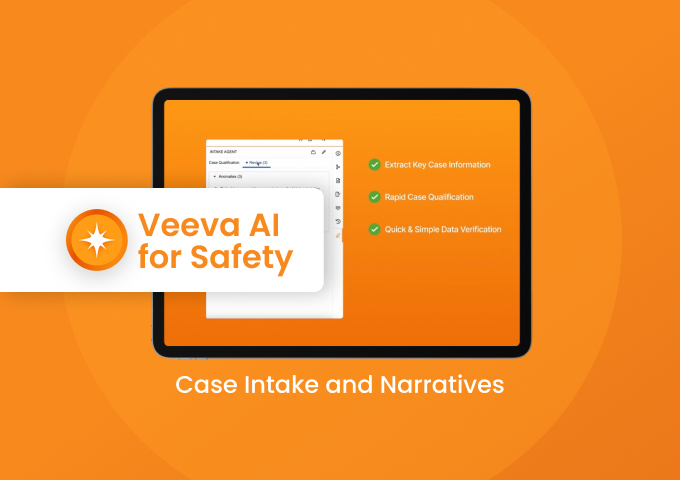Resource Center
Clinical Data
View More Clinical Data ResourcesRead Press Release
Veeva Announces eSource Application to Eliminate Paper

Learn More
Clinical Data Managers and CRAs Warn of Data Quality Risks

Learn More
A Blueprint for Clinical Trial Transformation: Results from Three Top 20 Biopharmas

Watch Video
UCB Drives Patient Engagement and ROI with Veeva eCOA

Clinical Operations
View More Clinical Operations ResourcesLearn More
Recordati Passes Recent Inspection with No Findings

Learn More
Improve Site Relationships for Faster, Higher-Quality Trials

Learn More
Faster Training, Faster Trials: Guide for Site Training

Learn More
TMF Trend Report: 6 Trends of 2025

Commercial
View More Commercial ResourcesMedical
View More Medical ResourcesQuality
View More Quality ResourcesLearn More
AstraZeneca: Embedding Partners Into the Global Supply Chain

Learn More
Learn, Confirm, Then Scale

Learn More
Richter BioLogics Drives Efficiency and Compliance with Unified Quality

Watch Video
medac: Simplifying Training and Document Management

Regulatory
View More Regulatory ResourcesWatch Demo
RTSM-Clinical Operations Connection

Read Press Release
Top Biopharmas Standardize Globally on Veeva Link Key People

Learn More
7-Step Guide to Veeva AI for PromoMats

Watch Video
Advancing Regulatory Processes with the Power of AI

Watch Demo
RTSM - eCOA Connection

Watch Demo
Link Key People in CRM

Learn More
AstraZeneca: Embedding Partners Into the Global Supply Chain

Learn More
Preparing for Manufacturing Growth With Digital Validation

Watch Video
From Site-Based to Unified Quality Management

Watch Video
Italfarmaco: Accelerating Rare Disease Launch with Vault CRM

Read Press Release
Veeva Announces eSource Application to Eliminate Paper

Read Press Release
Research Finds Building Foundation for AI a Priority for CPGs

Read Report
2026 Clinical Data Trend Report

Learn More
Advancing Site Payments: A Win-Win for All

Learn More
HCP Messaging Innovation Guide

Learn More
BMS: Data-Driven Feasibility & Faster Site Start-Up

Watch Demo
Quality-Safety Connection

Watch Video
Measuring Medical Impact: Quantifying Targeted Scientific Education

Learn More
4 Insights on PV Transformation

Learn More
Converging Standards, Connecting Platforms: Achieving One Global Submission

Result Not Found
The query that you've entered is not found.















![Safety [R]Evolution Podcast](https://www.veeva.com/eu/wp-content/uploads/2025/12/resource-tile-safety-revolution-340x240-1.png)

